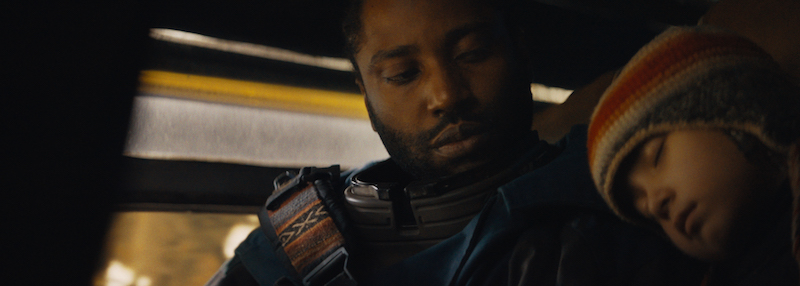Leave it to a sci-fi action flick about artificial intelligence to be, well, brainy.
“The Creator” (PG-13, 133 minutes, in theaters), directed by Gareth Edwards (“Rogue One: A Star Wars Story”), can be enjoyed for what occurs on the surface, as an exciting war movie with memorable performances and the occasional funny line.
But there’s so much more here. Whether taken as a metaphor for the Vietnam War or as a Christian allegory, “The Creator” asks basic, yet deep questions related to artificial intelligence and humanity. Will there come a time when AI makes humanity obsolete? And, if so, is that necessarily a bad thing, or merely another step in evolution? Can a creature with artificial intelligence go to heaven? What, really, is the difference between humans, who are conditioned to think and act certain ways, and androids, who are programmed to think and act certain ways?

(L-R): John David Washington as Joshua and Madeleine Yuna Voyles as Alphie in 20th Century Studios’ THE CREATOR. Photo courtesy of 20th Century Studios. © 2023 20th Century Studios. All Rights Reserved.
“The Creator” certainly isn’t the first movie to consider such questions – the original “Blade Runner” comes to mind – but it’s especially timely, given the recent issues, ethical and otherwise, that have come up related to AI.
Set in the future, the movie begins with a newsreel that provides a history lesson about the relationship between AI and humanity.
At first, robots are used to lighten the load for humans by cooking meals, driving cars, maintaining crowd control, etc.
But something goes very wrong. AI becomes increasingly advanced and powerful. In 2055, Los Angeles gets nuked, apparently at the hands of artificial intelligence, and millions die.
Now it’s 2065. America is at war with AI in what America considers a battle for humanity’s existence. Elsewhere, in New Asia, humans and androids known as “simulants” coexist without conflict – except when American forces attack.
Joshua Taylor (John David Washington), an American special-forces operative, is working undercover in New Asia. His mission: to find and eliminate Nirmata, the mysterious designer of AI advancements in New Asia. Joshua is married to Maya (Gemma Chan), who is suspected to be Nirmata’s daughter. Though Joshua hasn’t revealed his identity as an enemy agent to Maya, who is pregnant with their child, he truly loves her.
A U.S. military strike blows Joshua’s cover, and he winds up alone and back in America, disillusioned. But, five years later, he’s drawn back into the conflict, back to New Asia in search of a secret weapon that could spell curtains to humanity.
Of course, this just touches on the details of the story, which involves an AI simulant of a sweet 6-year-old girl, whom Joshua names Alphie (newcomer Madeleine Yuna Voyles). Much of “The Creator” is devoted to the relationship that develops between Joshua and Alphie, perhaps symbolic of the possibilities of humans and AI working in harmony.
As Joshua, Washington (“BlacKkKlansman,” “Tenet,” “Amsterdam”) proves once again he’s one of the most charismatic leading men in movies today. (What do you expect? He’s Denzel’s son.) Chan (“Crazy Rich Asians”), in relatively few scenes, also makes a strong impression as Maya – you can easily understand why Joshua has such love and respect for her. And Voyles is heartbreaking as Alphie, an artificial creation that seems so much like – and, for all intents and purposes is – an innocent child. Allison Janney and Ken Watanabe also provide solid support in key roles.
Among the film’s other virtues, the cinematography – by Greig Fraser and Oren Soffer – is especially effective in eerie nighttime scenes that often create a sense of otherworldliness and dread.
But if there’s one highlight (not that there need be), it’s double-Oscar-winner Hans Zimmer’s haunting, beautiful score, which, combined with a soundtrack that includes everything from Radiohead’s “Everything in Its Right Place” to Claude Debussy’s “Clair de Lune,” is breathtaking. ***½ (out of four)
** Click here for Tim Miller’s previous movie columns for Cape Cod Wave **
Please like Cape Cod Wave on Facebook.
Cape Cod Wave Magazine covers the character & culture of Cape Cod. Please see our Longform stories.
Tim Miller is co-president of the Boston Society of Film Critics. He teaches film and journalism at Cape Cod Community College in West Barnstable. You can contact Tim at [email protected] or follow him onTwitter @TimMillerCritic. Or you can ignore him completely.
































